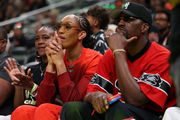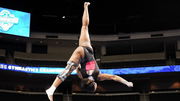

Kathy Johnson, the first American gymnast to win a major international medal, contemplated the end of her gymnastics career with three conditions: retire on her own terms, not stay too long, and not fall out of love with the sport. Looking at her career, it’s clear she achieved all three. She retired as an Olympic bronze medalist on the balance beam after the 1984 Los Angeles Games, also winning a silver team medal. This approach guided her entire life. Despite uncertainties after retiring, her enduring love for gymnastics led to significant transformations as a broadcaster. Her broadcasting journey started in 1983 until March of this year as, at the age of 64, Johnson Clarke made the bittersweet decision to retire from ESPN.
Watch What’s Trending Now!
In a heartfelt post on X, Johnson Clarke revealed her retirement, “To be clear, I’m not quitting broadcasting because of judging or nonsensical scores that don’t align with or reflect the Code of Points, making it obsolete. I am retiring because I am being retired as irrelevant, a relic from the past.” The issue with NCAA gymnastics judging this season was during the Tennessee Collegiate Classic in January, when four competing schools set new program records for team scores. However, these high scores were not sustained throughout the season, leading to criticism of the judging system.
However, Kathy Clarke candid revelation about being perceived as “retired as irrelevant” stirred curiosity among fans, prompting speculation about the deeper meaning behind her retirement. However, in an exclusive interview with EssentiallySports, Johnson Clarke elaborated on the significance of her retirement, shedding light on the reasons behind her retirement that had left the gymnastics community pondering her unexpected exit.
ADVERTISEMENT
During the exclusive interview with EssentiallySports conducted by Shreya Verma, Clarke was confronted with a probing question. Verma asked Kathy, “You’ve always been open about wanting things done by your own choice, and very rightfully so. However, you were not very happy with your retirement from NCAA commentary. In your retirement announcement, you mentioned feeling ‘retired as irrelevant.’ Can you elaborate on what led you to this feeling?”

ADVERTISEMENT
Kathy Johnson shared her life principles, starting with her experience as a competitive gymnast. She emphasized the importance of perseverance, saying, ‘As a competitive gymnast it became extremely important to me to “not quit.” In all honesty, it became an overriding obsession. I wanted to get to my finish line and retire feeling grateful and happy I had done all I could do, and I wasn’t sure I would know when that time was, hence the very real fear of quitting. I also didn’t want to stay too long or more important, fall out of love with the sport I’d loved so much.”
ADVERTISEMENT
She further elaborated, “When it became clear that my broadcast role was going to change significantly enough to make me feel like quitting, that I’d possibly stayed too long, or worse, that I would fall out of love I made the difficult decision to call it a career and retire. ,” Johnson Clarke wasn’t pushed out of broadcasting for her strong opinions on lenient judging. ESPN’s new leadership aimed to expand coverage, which created growth opportunities for others but left her unable to do her best work.

ADVERTISEMENT
She further added that by making this decision, she found joy and special meaning in her work during her final season, allowing her to leave with a very grateful heart after a 41-year broadcasting career. Reflecting on her favorite and most memorable experiences, she highlighted covering International elite gymnastics with ABC Sports in the ’90s and college gymnastics for ESPN, SEC Network, and ABC. These experiences bookended her career, making it everything she had dreamed of and more. But the way her foray in broadcasting is like a dream come true.
ADVERTISEMENT
How did Kathy Johnson Clarke’s broadcasting journey take flight?
Kathy Johnson Clarke’s broadcasting journey began unexpectedly. In 1983, amidst her training for the World Championship trials and the upcoming Olympics, she received an offer from CBS to commentate on the NCAA gymnastics championships. Initially hesitant due to her focus on training, her coach eventually encouraged her to take the opportunity. Little did she know, this would mark the beginning of a remarkable broadcasting career.
Her stint with CBS led to further opportunities, including covering the NCAA championships and Pan American Games for various networks. In 1990, she joined ABC, where she worked alongside Bart Conner for eight years, covering elite gymnastics competitions and the Olympics. Over the years, Johnson Clarke’s broadcasting career flourished, leading her to cover numerous prestigious events for various networks, including CBS, NBC, ESPN, and SEC Network. Despite facing challenges, including juggling motherhood with her broadcasting career, she continued to excel in her field.
Top Stories
Andy Reid Announces Patrick Mahomes’ Injury Diagnosis as Chiefs HC Doesn’t Hold Back After Playoffs Elimination

Former US President Joe Biden Keeps a Clear Demand to Eagles Owner Amid Jalen Hurts’ Struggles

Cowboys Star Risks Severe Punishment Over Justin Jefferson Incident vs Vikings

A’ja Wilson, Bam Adebayo Issue Strong Statement Against Rachel Nichols’ Question About Couple’s Privacy

Diego Pavia Issues Public Statement After Heisman Controversy Triggers Strong Reaction

Ex-Georgia Gymnastics Star Opens Up On Facing Mistreatment Months After NCAA Program Switch

Johnson Clarke’s influence extended beyond broadcasting. Her innovative approach to presenting gymnastics scoring, as seen in her creation of a program to simplify scoring for viewers, revolutionized how gymnastics was televised. She also mentored upcoming commentators, leaving a lasting impact on the sport’s coverage.
ADVERTISEMENT
ADVERTISEMENT
ADVERTISEMENT
ADVERTISEMENT

